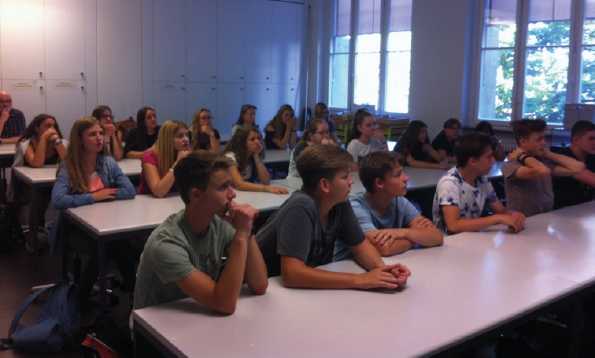Insight to the work of a research group
A class from Romanshorn High School visited in July the "Geophysical Fluid Dynamics" group of Professor Paul Tackley. Doctoral student Jessica Munch informs the students once a semester about her scientific work.
Within the framework of the EU project external pageUnderstanding subduction zone topography (SUBITO)call_made, Jessica Munch examines under which circumstances curved subduction arcs form.
In addition, the early career scientist works together with the Romanshorn High School within the framework of the SUBITOP partnership program. The aim of the program is to provide young researchers with outreach and teacher training by linking them to a secondary school and conducting regular class visits.

The ETH visit began with a lecture on numerical models and modelling by Dr. Kosuke Ueda and Professor Taras Gerya. By way of illustrative examples they showed how numerical models can be programmed and applied.
After the lectures, the high school students had a guided tour of the main building of the Department of Earth Sciences and the focusTerra exhibition. The visit to the exhibition was concluded with a visit to the earthquake simulator.
Prior to lunch, the students were presented with various study options in Earth Sciences and insight to professional activities.
In the afternoon, the high school students were engaged in various experiments, providing an insight to the work of an earth scientist. A friction experiment about the repeat occurrence of earthquakes was demonstrated and the question whether earthquakes could ever be predicted was considered. The second group, using simple numerical models, attempted to understand the behaviour of shell plumes. The third group investigated a drill core from lake sediments and its characteristics with regard to past events such as flood, debris flows, over-fertilization, etc. The students were very attentive to the introductory programme, took a positive impression home of their practical experience, and some even consider studying for a Bachelor's degree in Earth and Climate Sciences in the future.
